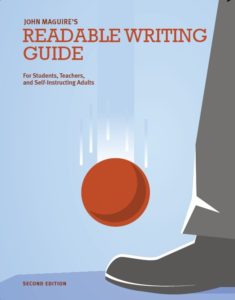An open letter to Dr. Douglas Hesse at the University of Denver.
In which I complain that the composition profession doesn’t understand
writing that well. In which I assert that writing is much more like juggling
while on a unicycle than the composition profession thinks.
I sent this on 1/18/2018.
Dear Dr. Hesse:
As I was writing a speech to give at a professional development day—the topic being college writing—I did some web searching and came across a number of pieces you have written, and comments you have made, for the Chronicle of Higher Education. Your piece called “We Know What Works in Teaching Composition” seems to me to be partially true and partially not true. Certainly it’s a reasoned piece. When you say “we know,” however, it does seem you are referring to yourself and your estimable colleagues at the University of Denver.
One could argue, and I would so argue, that the administrators of most colleges and community colleges do not know what works in teaching college composition—or else they know but don’t want to act on the knowledge. I’m basing this on the fact that colleges will throw almost anyone with a BA or MA into a freshman comp class and just let them sink or swim. In the last couple of years, for reasons I’ll explain, I’ve talked with at least 20 adjuncts from around the country who express extreme frustration with their freshman comp classes. A typical phrase is “I’m banging my head against a wall trying to get them to improve.”
And when the colleges don’t let instructors do their own thing but force them follow a particular syllabus, those syllabi are usually incompetent. A syllabus is a list of topics to be covered, but as you truthfully said, writing requires “sustained, guided practice.” Writing instruction provides skills to be learned and integrated. I have never seen an imposed syllabus built on any kind of sustained and guided practice. Administrators are blissfully or willfully ignorant (with some few exceptions, I assume) of how to write and how to teach writing. That’s because the effective teaching of writing is expensive and administrators gain praise for saving money, not for creating powerful writers.
The foregoing is fairly general and I’m happy to admit it’s my take on things, based on my 30 years of teaching writing in and around the Boston area at various schools including Boston University, the Berklee College of Music and Babson College, not to mention a community college or two.
You are a well-established authority, judging from your CV and the positions you’ve held with NCTE and such organizations. I got nothing against that.
In the last five years I’ve written a number of articles about writing pedagogy. They’d have to be called contrarian because I assert that the field, as a whole, is not teaching writing effectively. The authority figures in the field keep saying, more or less, we know what we’re doing—don’t bother us even though there’s a nationwide chorus of complaints that college grads can’t write clear sentences, memos or reports when they reach the workplace. Are all the business owners and managers distressed about the inability of their young employees to write decently—are they all wrong?
The 20 or more adjuncts I’ve spoken to recently have all gone to my website, read what I have to say about “readable writing,” and bought my freshmen comp book to use or steal from. Some of them love it, some are baffled by it, but a great many say “There’s nothing else like this out there.” I know they’re right, for various reasons, one of which is that I wrote the book in order to be different from everything else because all the standard books have a built-in teaching error that the field has not noticed.
We are both veterans of life, so we both know that people high up in a field have a natural investment in the status quo and when confronted by someone saying “you guys have missed something really important,” they will often respond (imagine a Victorian Dr. John Watson expostulating): “Confound you, sir, that’s a damnable insult to my peers!”
Anyway. Let me tak e another sip of my beer and continue.
e another sip of my beer and continue.
I think the field of composition knows the basics but has in fact missed something important. The field knows that writing is a two-tier skill—that sentence composition is the first skill, and arrangement of sentences is the second skill. But currently, in most places, instructors try to teach both skills at the same time. They make assignments, and then give marginal feedback on both the sentence level (“use more active verbs”) and the essay level (“thesis sentence needs better focus”) at the same time. You can teach this way, but it’s ineffective; it’s a classic training error that somehow the field of composition has not noticed.
If you wanted someone to juggle while riding a unicycle, you would not ask them to attempt both skills at once. You’d train for one, and then for the other, and then combine them. I assert that expository writing is the same sort of thing: there is handling sentences and then handling arguments. It’s like riding and juggling. They have to be done at the same time but they are not the same thing.
I’ve found that the effective way to teach freshman comp these days is to separate the course into two phases, teaching sentence control in the first eight weeks and essay construction in the last six. When you do it that way you get rapid improvement. I have specific, well-reasoned and well-tested techniques for each phase.
Doug, If this interests you and does not seem damnably impertinent you’ll find a bit more at the links on this website. This piece by Michael Laser, a New Jersey novelist who teaches sometimes, might be instructive, also.
Cordially,
John G. Maguire


Leave a Reply